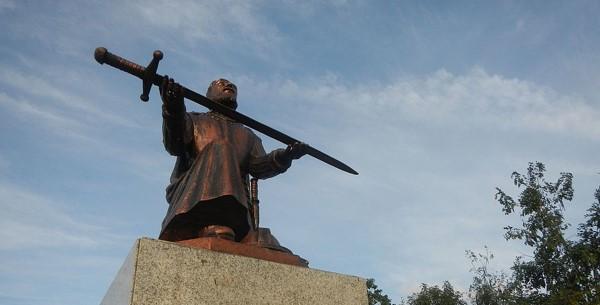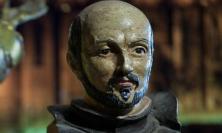Celebrations of the feast of St Ignatius Loyola will look very different in 2020 in the shadow of the Covid-19 pandemic, but every feast day ‘is a moment in which we renew our relationship, not with an ideal, but with a person’, says James Hanvey SJ. Perhaps, then, this is an opportunity to meet the Ignatius who knew what it was like to face crises and complications. How can he help us to find the graced freedom to respond to the needs of the world today?
The 31st of July is probably not the best date to celebrate a feast. In my experience, people are either on holiday or preparing to go on one. Yet, the feast of St Ignatius 2020 will be different. Covid-19 has left nothing untouched. Lives have been changed and precarious futures have become even more unpredictable.
The pandemic has opened our eyes to our collective vulnerability; we can no longer ignore the fragilities of our health and social systems. The virus has shown us how difficult it is not to politicise and weaponise disease; it has exposed the underlying values that shape the decisions that sacrifice lives to protect the economy and, long before Covid-19, allowed social and racial inequalities to widen. Fear restricts our relationships and it shrinks our social imagination.
No doubt on this year’s feast we will hear many of the usual things about Ignatius and Ignatian spirituality. Even when we strip away the hagiographical excess of previous generations to discover a more contemporary and human Ignatius, we are still in the business of constructing an exemplar or an ideal.
It is easy for our saints to tower above us, in beautiful monumental statues or captivating paintings. They seem forever removed from our daily realities, quietly gathering dust in some platonic pantheon of eternal forms. Yet, a feast is not just an opportunity to dust off the images and pull out the liturgical stops. It is a moment in which we renew our relationship, not with an ideal, but with a person.
For the saints are not dead, they are filled with an abundance of life; they are still our companions and friends on the journey. Ignatius understood this; he called them his ‘intercessors’ in the heavenly court and frequently sought their help. He saw that real saints do not stand outside of time, but they continue to be workers with the risen Christ for us and for our world.
As we journey through the valleys of darkness, theirs is the song that lifts our hearts and theirs is the friendship that strengthens our will. Everywhere, they come to meet us, witnesses that we are not alone or abandoned, that our hope is not in vain, that Christ is the Lord of history and he is our home.
So, on this feast of St Ignatius we find him walking with us, still a pilgrim on our pilgrimage. As our companion, what might he want to share with us to keep us going in these difficult times?
For a start, I think he would ask us not only to focus on the spiritual but also on the practical. In his own life and in that of the early Society, we can see how one is nourished by the other. Like so many caregivers in hospitals and homes today, Ignatius and his companions did not hesitate to help the sick or the victims of the plague.
They knew they were at risk but somehow ‘the love of Christ’, the love of neighbour – especially one who was in need – was always greater. It was this that determined priorities and made them creative in finding the means to respond. Even faced with the uncertainties and daunting needs of our own time, I think Ignatius would encourage us to live in this magis – the movement of the Spirit who enables us to transcend our fears and prudent self-protection for the sake of others (‘caritas Christi urget nos’ [2 Cor 5:14]).
Near the end of the Spiritual Exercises (§230), Ignatius frames the great concluding contemplation of God’s love with the simple principle that, ‘love ought to show itself more in deeds than words’. For him it was no cliché. We prove love by living it and when we do, it changes things. Simple though it is, it is a revolutionary truth.I don’t think Ignatius found it in books of philosophy, theology or self-improvement and well-being. For him, it was not a principle but a person. It was all that he had experienced and seen in the reality of Christ. He learned it from Christ, and he understood that it was the way Christ wanted to be served – to put our love for him into action by loving the world that he loves in all its neediness.
This was the mark of his own life. In the midst of so many complications and crises, he would want us to see that we can only begin from Christ. From this vantage point, what love needs to do becomes clear and we can find the grace to do it. With Christ our fears are left behind. We discover that love is not finite. It does not diminish or run out with use. When we feel paralysed or uncertain, it is usually because we have lost our focus and our centre.
Looking at the state of our world, Ignatius might ask us to examine how free we are to respond to its needs. Let me suggest the four freedoms, or the four dimensions of a graced freedom, that he might help us to discover: the grace to change, the grace to follow and serve, the grace to persevere, the grace to build a new community. We need these graces at every time, but especially in times of crisis and challenge when we feel that we, our families and friends are under threat.
1. The graced freedom to change
If we learn anything from Ignatius it is that we can change, and change for the better. Authentic change can only come when we are free. In some way, human beings are unique in possessing the capacity for freedom. It makes us powerful agents in the world, able to shape it for good or for bad. Our choices matter.
In the gift of freedom, we discover something of God’s own image in us. God does not create us out of need, but out of a pure goodness and love. In God’s decision to become one with us, even to endure humiliation, agony and death for us, we see both the depth and the power of God’s freedom. God’s freedom reveals that God is love. Such absolute freedom cannot be limited or threatened by our freedom; on the contrary, it calls us out of all our prisons and bondages, and restores our freedom with life. God cannot oppress us. If God has created us to love, then God has to make us free.
Through his own experience of conversion and call, Ignatius understood this. He also learned that this gift of freedom was always under threat. Whoever controls our freedom, either by coercion or deception, is the one who possesses us.
Ignatius knew the tempting illusion that we could somehow free ourselves and become our own masters. The first gift of wisdom is to recognise that only Christ can set us free. Our freedom was created as gift and is restored only as gift. Our response is to receive it with humility and gratitude from the hands of Christ, through the life-giving power of the Holy Spirit. Discernment is the way we can hold onto the gift through our constant choice to bring all things back to Christ and judge them in his light. This practice of our graced freedom makes us dangerous agents of change in a world that is always seeking to offer us liberation while placing us in servitude.
2. The graced freedom to follow and to serve
If the first act of our freedom is to change, the second is to hear Christ calling us, saying ‘do not be afraid’, to follow a crucified Christ, to surrender to the incomprehensible mystery of the cross and trust in this alone: God’s freedom is not to be bound by our logics, expectations and laws.
The third act of our freedom is to choose to serve the risen Christ in the tangle and suffering of human history; the freedom to be judged a fool. In short, all three of these acts of our freedom are really only one act: to say ‘yes’, without any conditions, to the call and the way that Christ has traced.
All through his life Ignatius seeks this ‘yes’. In it lies service of God and of neighbour. It is a ‘yes’ captivated by Christ, by the vision of a love greater than ourselves, that lives in transcendence and finds itself in service of the needs of others without any reward or acknowledgement. It is a magnificent freedom. It allows us to be truly creative in discovering new possibilities even in the midst of chaos and destruction.
This graced freedom is not daunted by resistances or obstacles. It takes its measure from God whose love never ceases to ‘labour and work’ for us even when we may reject it. In our unbelief, God hears our cry of pain and loss, our doubts as whispered prayers listening for a response.
God rejoices in every act of kindness, love and generosity, whoever shows them, for these, too, are the seeds the Spirit has planted in the hearts of all women and men – the seeds that carry within them the divine name.
The Spiritual Exercises conclude with the Contemplation to Attain Love, in which we are drawn to God’s love at work in all things. Not so much an ending but a beginning, for the world in which we are living, the world to which Christ is sending us, is not a desert. It is not dead. It is filled with God who never ceases to uphold it and fill it with the new possibilities of life. I think Ignatius would remind us, especially when we are getting weary, that such a world, no matter how wounded, is not lost, that it can change. For the risen Christ is always the unending possibility of our freedom. This is why our world can always be saved; it can learn again how to love both in word and in deed.
3. The graced freedom to persevere
If this truly is the deeper reality of the world’s hope, we come to the other grace which freedom needs. This is the under-valued grace of perseverance – a rather dusty grace, I know, but without perseverance nothing truly creative can be achieved.
Perseverance is the way in which we hold on, in faith, to God’s own faithfulness. Whether in human relationships or in God’s service, perseverance is an act of fidelity, of being true to ourselves, to others and what we value most. It is the act of faith which labours and remains firm, whatever the circumstances, holding on to that which is good and life-giving, refusing to surrender our hope to cynicism or despair. It is perseverance that allows the routines and sacrifices of daily life to glow with their own quiet glory.
In perseverance we come to understand that hiddenness is not absence, but another dimension of grace at work. Ignatius helps us understand this. When contemplating the trial, passion and death of Christ, he invites us to ponder the great mystery of ‘how the divinity hides itself’ on the cross. Ignatius learned not to be afraid of the darkness, for he could see that it was in darkness that Christ wrought his greatest work.
There, too, Ignatius helps us to see that solidarity with the crucified and powerless Christ leads us to solidarity with all who suffer and feel abandoned. In a strange way, when the divinity hides itself, it brings all the hidden, the disappeared, the crucified to light. They come before us, and our world is exposed to their truth.
The grace of service is to persevere, to ‘labour and to work’ with Christ, with the assurance of faith. For Ignatius, the work to be done was always at hand but the future was Christ’s gift – it was his future.
Perseverance is our fidelity to God’s future, our act of generosity to life now, and still to be. Without it, we would not be celebrating ‘Saint’ Ignatius, or indeed any saint.
4. The graced freedom to build community
The future that faith sees, through the triune light of grace, is not just ‘my’ future, it is ‘ours’. The philosophers tell us that goodness is self-communicating; by its very nature it creates community. If we learn anything from our encounter with Christ, surely it is that the kingdom communicates its grace in and through a community.
Again, as Ignatius saw, we cannot persevere or accomplish the work on our own. If it is Christ who calls, it is the Spirit who gathers, sustains, empowers and sends this community into ‘the vineyard of the Lord’.
After Manresa, Ignatius began as an apostle without a community, but he soon realised that the greater service of Christ and his Church required others. We need their gifts, their insights, their energy, their criticism and their care. Ignatius can help to see that we need the generosity of perseverance to build a new community. It is perseverance that gives us the time to forgive and turn words into loving deeds. The community that perseveres knows how to wait on God’s time; it knows that it lives by the gift of the Spirit and not by its own strategies for survival.
If we have learned anything from the experience of the pandemic it is not only that we are vulnerable but that our lasting security does not lie in building walls of exclusion; it lies in establishing a new sense of community and solidarity. If we want to build something that lasts beyond the next crisis, we need all the graces of freedom that Ignatius can show us. Above all, it begins with the grace to change; to change not only what we do but our way of seeing and thinking and judging. The grace of such freedom allows us to take the risk and move beyond our fears and comforts, to discover that only together, only when the most vulnerable are secure, are we all secure. And with the freedom to change comes the grace to imagine a society, an international community, in which no one is forgotten or needs to fear, in which creation is cherished and respected; all its goods are shared so that all life may flourish.
So, on this feast of St Ignatius 2020, while we continue to live within the pandemic, Ignatius can still speak to us. His realism does not offer us any romantic vision or utopian programme for ourselves or our world, but it offers us the resources to discover again the freedom of Christ, to change, to persevere in the works of faith, hope and love – these great works of consolation – that God may be glorified and our world may have life.
James Hanvey SJ is Secretary for the Service of the Faith for the Society of Jesus.






